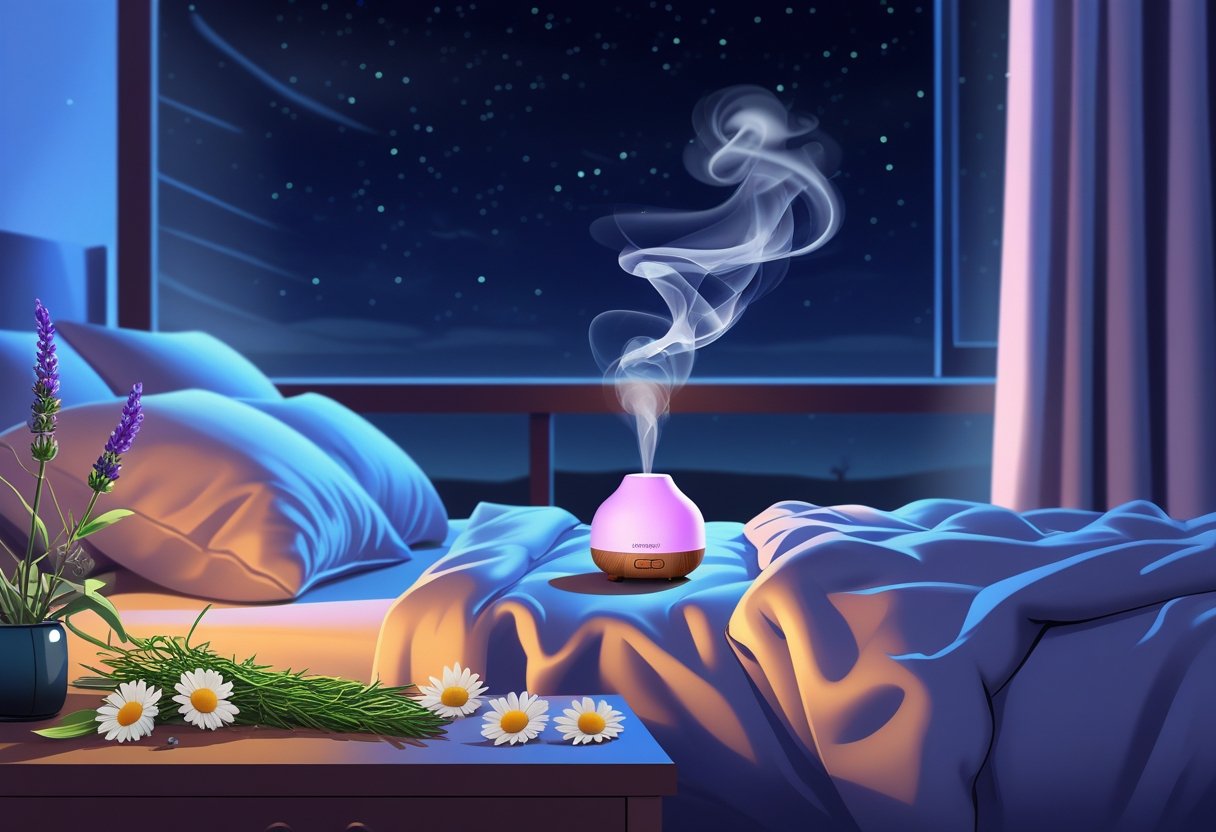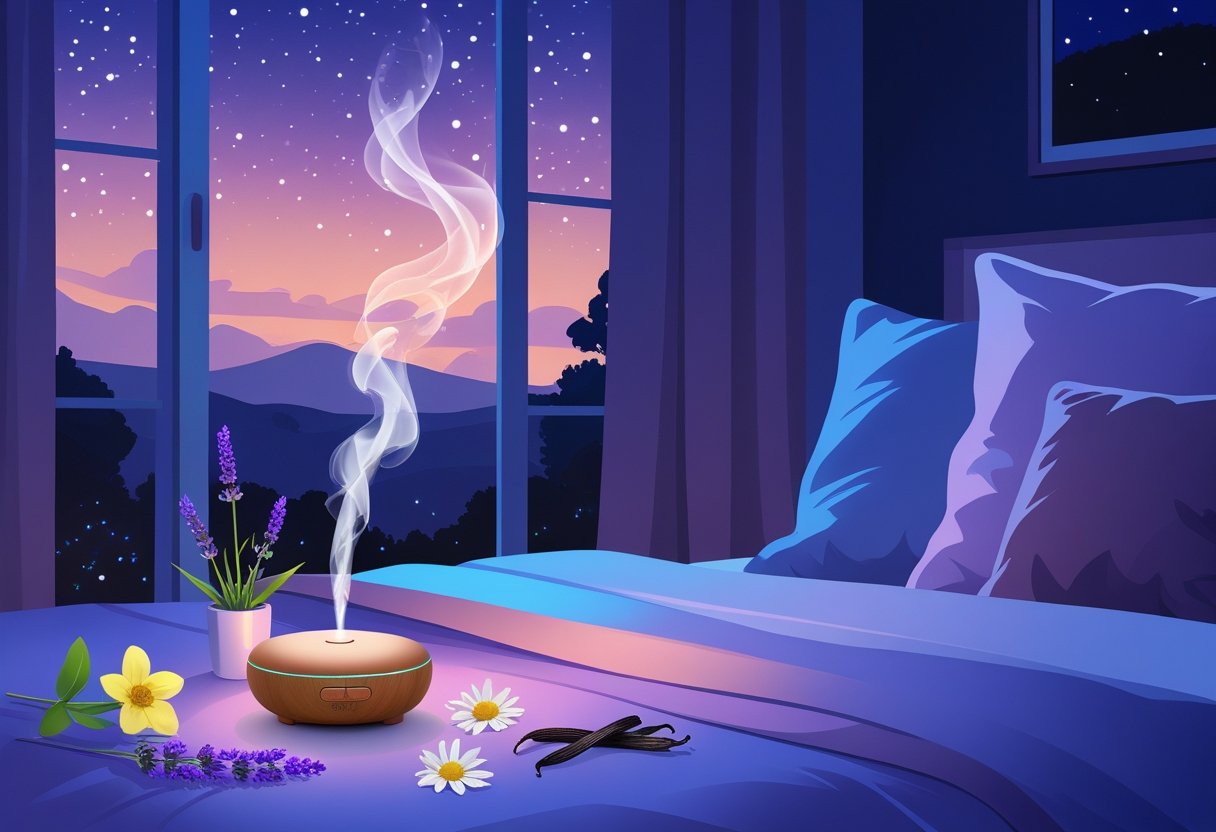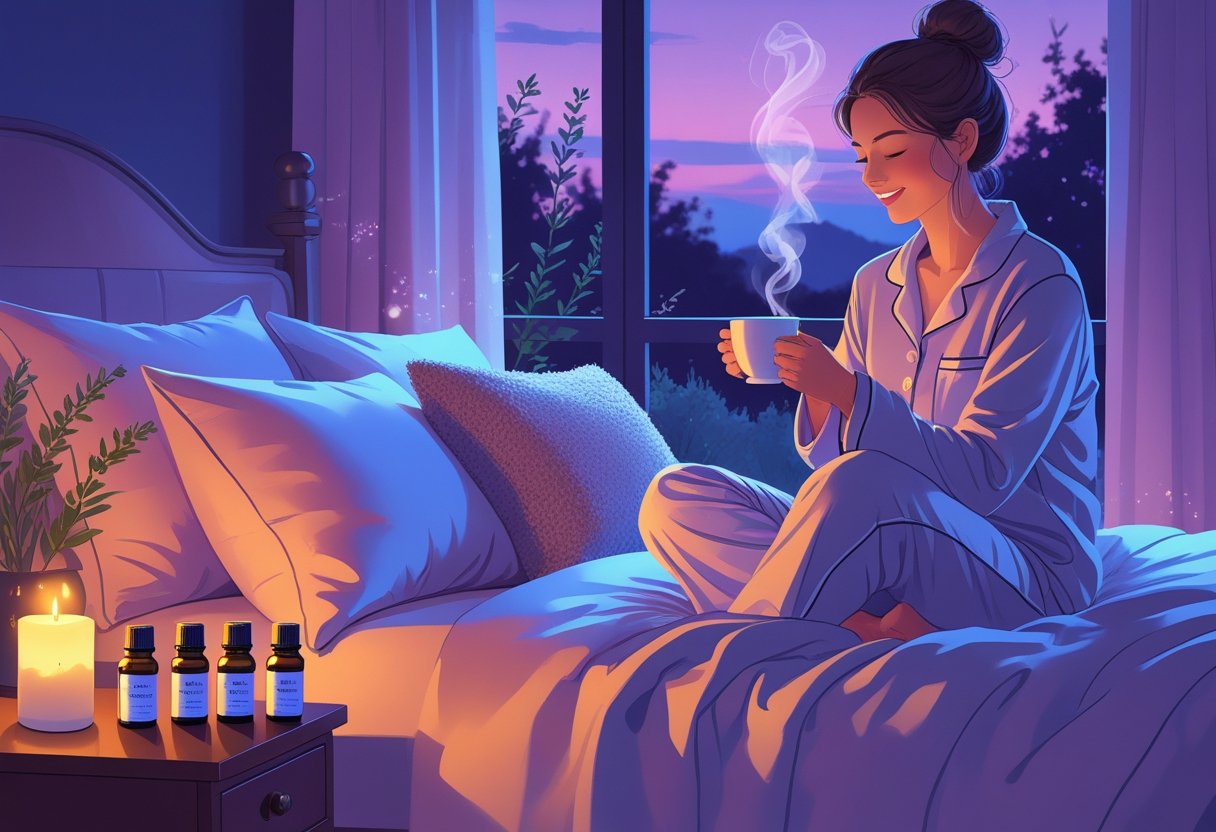Many people struggle to fall asleep or stay asleep because their minds are too active or stressed. Certain scents can help calm the mind and body, which makes it easier to rest. Fragrances like lavender, sandalwood, and jasmine can help the body relax and improve sleep. These scents affect the brain’s stress response and can ease tension in the body. Using them at night can signal that it’s time to rest. You can try pillow sprays, diffusers, or lightly applying diluted essential oils to the skin.
Different scents work differently for each person, so it helps to test what feels best. Adding calming aromas to your nightly routine is a simple way to support sleep and overall relaxation.
Key Takeaways
- Relaxing scents reduce stress and can help you fall asleep faster.
- Using calming aromas consistently can improve sleep over time.
- Diffusers, sprays, or oils make it easy to add soothing scents to your routine.
- Combining calming scents with a supportive mattress can turn your bedroom into a restful space that helps your body relax, settle, and ease into deeper sleep.

Why Relaxing Scents Influence Sleep Quality

Relaxing scents affect sleep quality by triggering specific responses in the brain and nervous system. Natural aromas like lavender, chamomile, and jasmine can calm the mind and body and make it easier to fall asleep and stay asleep longer.
The Science Behind Calming Aromas
Natural scents contain compounds that help the body relax and reduce stress. Lavender oil has linalool and linalyl acetate, which can lower anxiety and blood pressure. Chamomile has flavonoids that calm nerves, while jasmine may slow the heart rate and lift mood. When you breathe in these aromas, they influence the autonomic nervous system. This system controls unconscious actions like heart rate and breathing.
Relaxing scents guide the body toward a restful state, supporting faster sleep onset and more restful sleep.
Role of the Limbic System in Scent Response
The limbic system handles emotions and memories. It connects directly to the olfactory nerves, which detect smells. Smelling calming aromas sends signals straight to this system. When the limbic system responds to scents like lavender, it triggers the release of chemicals such as serotonin and dopamine. These chemicals lower stress and anxiety, which can interfere with sleep. This helps the mind and body get ready for rest.
Connection Between Aromatherapy and Sleep Hygiene
Adding relaxing scents to a bedtime routine supports healthy sleep habits. Using oils like lavender or chamomile in a diffuser or spray tells the brain it’s time to unwind. This also reduces distractions from daily stress. Consistent use of soothing aromas creates a sense of calm and safety, which can help you fall asleep faster and sleep more soundly. Pairing scent with other bedtime habits helps the body align with its natural rest patterns.
For more on how scents affect sleep, explore the details on how smell affects your sleep environment.
Best Relaxing Scents for Sleep
Certain aromas can calm the mind and signal the body to relax before sleep. These scents work by affecting parts of the brain that control mood and stress. Knowing the effects of each can help pick a scent that supports better rest.
Lavender: The Classic Sleep Aid
Lavender is the most recognized scent for sleep. It contains compounds like linalool and linalyl acetate that act as natural relaxants. They help slow the heart rate and lower blood pressure, creating a calm state before bed. Research shows lavender can increase slow-wave sleep, the deep stage where the body restores itself. It also helps reduce waking during the night, supporting longer and more restful sleep.
Using lavender oil in a diffuser or as a pillow spray sets a relaxing atmosphere. It works for most people and blends well with chamomile or other mild scents. Choosing natural lavender oil avoids chemicals found in synthetic versions.
Chamomile: Gentle and Calming
Chamomile has a soft, apple-like aroma and contains apigenin, which interacts with GABA receptors in the brain. This helps ease tension and quiet the mind without using medication. It suits those who prefer a light and gentle scent for falling asleep. Chamomile works alone or with lavender in a diffuser or pillow spray.
Chamomile is also popular in bedtime baths or massages. Its calming effect helps the body and mind relax, paving the way for deeper and restorative sleep.
Jasmine: Floral Tranquility
Jasmine has a sweet, floral smell that can improve overall sleep quality. It activates the parasympathetic nervous system, lowering anxiety and heart rate so the body can relax. Unlike scents that mainly help with falling asleep, jasmine supports full-night rest and more time in the deepest sleep stages. A good night with jasmine can leave the mind sharper the next day.
Using jasmine oil in a diffuser or mixing it with other calming oils creates a peaceful environment. Its floral aroma appeals to those who enjoy a soft, inviting scent for sleep.

Other Effective Scents to Enhance Rest
Certain scents can calm the mind and ease tension. These aromas help create a relaxed atmosphere, which lets the body get ready for sleep naturally. Using these scents alongside familiar ones like lavender, chamomile, and jasmine can support better sleep.
Sandalwood: Earthy Serenity
Sandalwood has a warm, earthy smell that slows down brain activity. People use it in aromatherapy to reduce stress and feel calm. Its grounding effect can make it easier to fall asleep without racing thoughts. It mixes well with floral scents like jasmine and chamomile, which also encourage relaxation. Sandalwood is found in essential oils and incense sticks, making it easy to include in a nightly routine.
Cedarwood: Woody Comfort
Cedarwood gives off a deep, woody aroma that soothes the nervous system. It can increase sedative chemicals in the brain, which helps with sleep. This makes cedarwood helpful for people who feel anxious or have trouble staying asleep. Using cedarwood oil in a diffuser or as a pillow spray can make the bedroom feel cozy and calm. Its natural scent blends nicely with other sleep aids, such as lavender, to support rest.
Vanilla: Cozy Sweetness
Vanilla has a sweet, inviting smell that lowers anxiety and stress. Its warm sweetness creates comfort that calms the mind quickly. It pairs well with chamomile or lavender to create a relaxing mix. Vanilla-scented candles or oils can turn a bedtime routine into a calming experience with little effort.

Unique Floral and Herbal Sleep Scents
Certain floral and herbal scents offer qualities that help balance mood and calm the mind. These scents create a relaxing atmosphere without being too strong, which makes them useful for sleep.
Rose and Geranium: Floral Blend
Rose and geranium create a soft, floral aroma that helps the mind relax. Rose is known to reduce stress and lift mood, while geranium adds a fresh, slightly sweet note to balance the scent. This blend helps ease anxiety and bring a sense of calm. It is used in aromatherapy to prepare the mind for rest. The floral notes stay gentle, so they don’t overwhelm the senses and allow a peaceful environment.
Using rose and geranium in pillow sprays or diffusers can support bedtime routines. Their effect encourages mental relaxation and may improve sleep by calming the nervous system.
Sweet Marjoram: Herbal Warmth
Sweet marjoram has an earthy, warm aroma that supports both physical and mental calm. It has a slightly spicy and herb-like scent that soothes tension and encourages relaxation. This herbal fragrance can ease muscle tightness and reduce stress. It blends well with other relaxing scents and is effective in sleep-support combinations.
Sweet marjoram’s grounding effect is helpful for people who feel restless. In aromatherapy, it can create a balanced, calm state that prepares the body and mind for sleep.
Ylang Ylang: Exotic Relaxation
Ylang ylang has a unique floral scent with sweet and slightly fruity notes. It helps reduce anxiety and brings a feeling of ease. This exotic aroma can slow heart rate and relieve nervous tension. Ylang ylang is usually used in sleep blends to create a calming and inviting atmosphere.
Its fragrance pairs well with other soothing scents, giving a rich and layered aroma. Ylang ylang helps those who struggle to wind down at night by promoting emotional calm and relaxation.
How to Use Relaxing Scents in Your Evening Routine

Relaxing scents like lavender, chamomile, and jasmine can help create a calm atmosphere that supports better sleep. Using these scents in different ways can gently signal the body to unwind and prepare for rest.
Aromatherapy Diffusers and Mists
Aromatherapy diffusers spread essential oils into the air as a fine mist. Oils like lavender or chamomile fill the room with a gentle scent that can help the mind relax. Add a few drops of your chosen oil to the diffuser with water and turn it on about 30 minutes before bed. This gives the scent time to settle in the room.
Mists and room sprays provide a quick burst of fragrance. Spritz a lavender or jasmine spray around the bedroom before sleep. They are simple to use and work well for small spaces or when traveling.
Scented Candles and Pillow Sprays
Scented candles give both light and fragrance, creating a cozy space. Choose candles with calming scents like chamomile or lavender. The soft flicker of candlelight helps lower stress. Light a candle about an hour before bed and blow it out before sleeping. The scent stays in the air and keeps the room feeling calm.
Pillow sprays are designed for bedding. They usually include sleep-friendly scents like jasmine or lavender. Spraying a little on pillows or sheets adds a subtle aroma that lasts through the night.
Topical Oils and Bath Additives
Diluted essential oils can be applied directly to the skin. Oils like lavender mixed with a carrier oil can go on pulse points such as wrists or behind the ears. This helps the body relax and eases tension before bed. Adding a few drops of chamomile or lavender oil to a warm bath can calm both body and mind. The warm water with gentle scents can loosen muscles and quiet thoughts, making sleep come more easily.
These methods give hands-on ways to use relaxing scents and help turn an evening routine into a more intentional and calming experience.
Tips for Maximizing the Benefits of Sleep Scents

Using sleep scents works best when more than just the aroma is considered. The bedroom environment, safety in using oils, and a steady bedtime routine all play a role. Paying attention to these details improves the experience with calming scents.
Creating a Restful Bedroom Environment
A calm bedroom helps sleep scents do their job. The room should stay cool, around 65–68°F (18–20°C), to support the body’s natural drop in temperature during sleep. Controlling light is important. Blackout curtains block outside light and keep the room dark to protect melatonin. Covering or removing electronics with glowing screens also reduces disruptions. Sound affects sleep too. White noise or nature sounds mask sudden noises. Keeping the space clean and uncluttered lowers stress and lets the brain settle.
Combining these factors gives sleep scents a better chance to work.
Combining Scents Safely
Essential oils need careful use. Always dilute natural oils in a carrier oil like jojoba or coconut before putting them on skin. A common mix is 1–2 drops of essential oil per teaspoon of carrier oil. A patch test on the inner wrist can reveal any irritation within 24 hours. Avoid applying oils near the eyes, inside the nose, or on broken skin. Some oils are unsafe for pregnant people or those with medical issues, so checking with a doctor is smart.
For diffusing, 5–8 drops for about 30 minutes before bed works well without overpowering the room. Cleaning diffusers regularly prevents mold and keeps the air fresh.
Establishing a Relaxing Sleep Ritual
A routine with scents teaches the mind to connect certain smells with sleep. A warm bath with 5–10 drops of lavender or chamomile diluted in carrier oil can relax the body. Rubbing a small amount of diluted oil on pulse points like wrists and temples adds calm. Running a diffuser during slow breathing or meditation signals that it’s time to wind down.
Doing this consistently each night trains the brain and body to expect rest, improving sleep quality. Combining a steady ritual with a quiet room and safe scent use gives the best results.
How Relaxing Scents Can Improve Your Sleep and Mattress Experience
A soft and gentle scent can shift the feeling of a room. When the air smells light and comforting, the mind slows down and the body follows. It becomes easier to fall asleep and stay asleep through the night.
Lavender, chamomile, rose, and jasmine each bring their own kind of calm. They help ease stress, lower heart rate, and loosen tightness in the body. In this state, it’s easier to rest without feeling tense or alert. Combining these scents with a mattress that supports your body creates an even more restful space. Soft, breathable bedding and a light aroma wrap around you like a cozy nest. It feels easier to relax and drift into sleep without effort.
Here are a few scents worth trying and what they do:
- Lavender — encourages calm
- Roman Chamomile — eases anxious feelings
- Rose — lifts mood and soothes
- Jasmine — supports steady sleep
You can use a light fabric spray or a few drops of essential oil on a pillowcase or cotton cloth. The goal is to keep it subtle, not overwhelming.
If you’re looking for a mattress, the Leesa Sapira Hybrid is one option to consider. It mixes foam and coils for balanced support, gentle pressure relief, and bounce. The layers let air pass through, and the coils help reduce movement if someone shares the bed. When a peaceful scent meets the right mattress, your room shifts from a simple sleeping space to a true place of rest. It becomes somewhere your body can settle, recharge, and feel safe.

Frequently Asked Questions
Certain essential oils can help calm the mind and body, which may lead to better sleep. When used the right way, these scents can support rest and reduce sleep disruptions.







